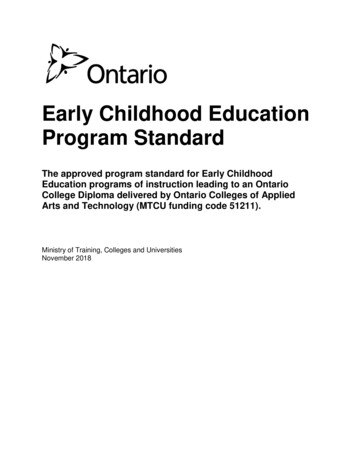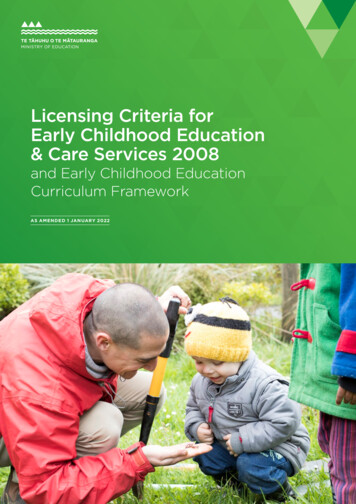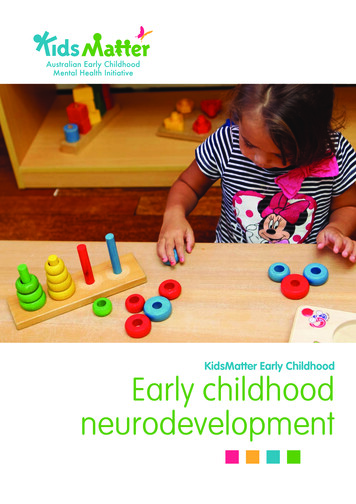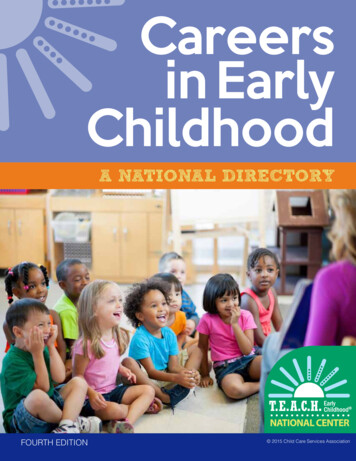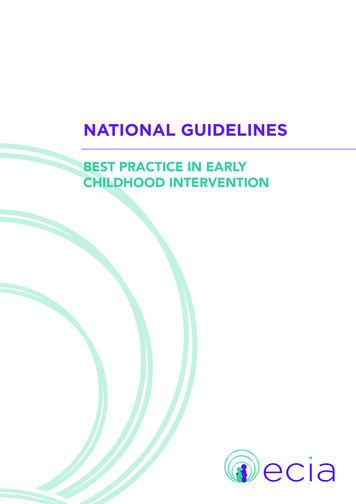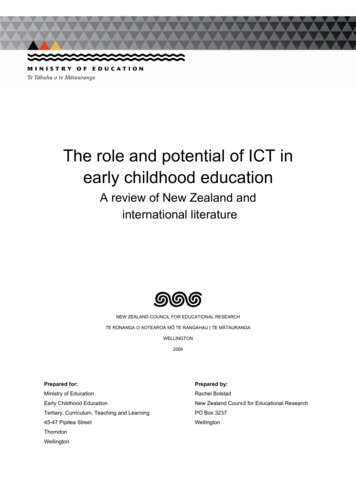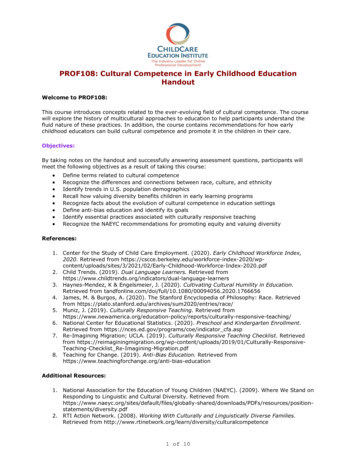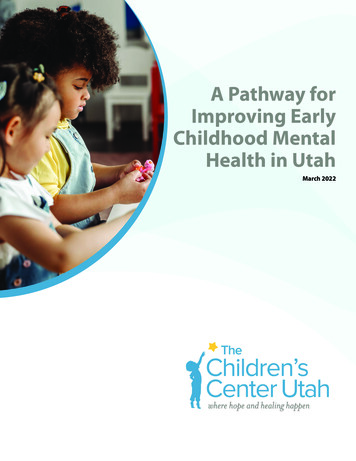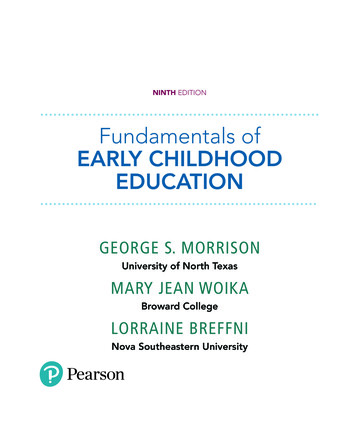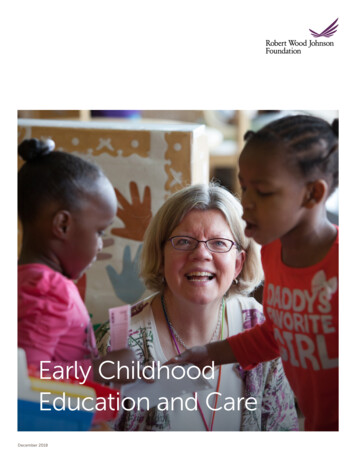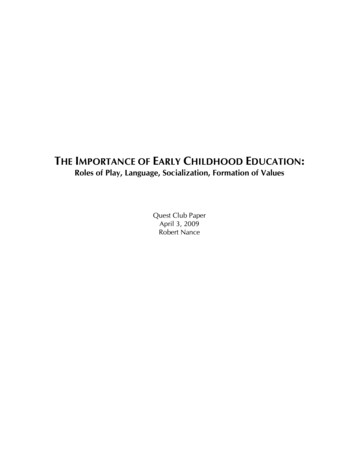
Transcription
THE IMPORTANCE OF EARLY CHILDHOOD EDUCATION:Roles of Play, Language, Socialization, Formation of ValuesQuest Club PaperApril 3, 2009Robert Nance
Opening RemarksHow many Maestros does it take to change a light bulb? No one knows, becauseno one has ever bothered to watch. Though rare, I admit there have been times when infront orchestra or chorus that my gyrations on the podium in serious musical pursuit haveserved little more purpose than the utility of a fan to keep the performers cool.Today, however, my purpose is rather more important. I want to assure you all thatI am not a figment of your imagination; that I am indeed here to deliver my January 30thspeech on the importance of early childhood education. Since this paper has beenrescheduled a couple of times this year, I feel a bit like a check drawn on the FederalGovernment‖s check register – made of rubber with a bounce that will keep us allwondering when and where it will land. For your forbearance and cooperation, I amgrateful - it has been a significantly robust and busy year for me as teacher and performerand the flexibility afforded me by the change in schedule has been a blessing.I confess that when the subject of my quest was given, shock came over me. Thesubject has been considered and studied for no less than 5000 years (and probably more),many colleagues in education have spent years advocating for and defending the cause,and the thought of addressing the importance of childhood education for the 5000 and 1styear caused my reasonably healthy body to convulse uncontrollably, writhing in aTourette-like episode as it released a single syllabic, colloquial explicative: DUH.Alas, I accept that something as commonplace as childhood education easilypasses from focus, giving way to the ever-present emergency that is salient in the minds ofthe general population, and, therefore short-changed if not for nagging advocates whounderstand and remain focused on the subject.So, here I am I have accepted my quest .and I feel good about it! Let‖s getstarted.THE IMPORTANCE OF EARLY CHILDHOOD EDUCATION – BY ROBERT NANCEQUEST PAPER APRIL 3, 20092
THE IMPORTANCE OF EARLY CHILDHOOD EDUCATION:Roles of Play, Language, Socialization, Formation of ValuesIntroduction“Give me the children until they are seven and anyone may have them afterwards.”-Francis Xavier1“Education is too important to be left solely to educators” – Francis Keppel2“All I really need to know, I learned in Kindergarten” – Robert Fulghum3“You cannot teach a man anything; you can only help him find it within himself”—Galileo Galilei4“I have never let my schooling interfere with my education” – Mark Twain5These simple statements by Jesuit priest Francis Xavier, American educator FrancisKeppel, author Robert Fulghum, the Italian scientist Galilei, and American humorist MarkTwain, bring simplicity and substance to the quest I have been assigned. The subjectmatter is not without controversy and political ramifications, particularly when students inthe United States consistently fall well below the math and science capabilities of studentsin other countries6 and ever increasing social ills have forced communities to focus on thefundamentals of what makes a good citizenry. Essentially, nothing is as good atpreventing social ills, and creating a positive and productive society as good parenting andpurposeful early childhood education.7Two recent developments have stimulated growing public discussion about theright balance between individual and shared responsibility for that strong foundation. TheTHE IMPORTANCE OF EARLY CHILDHOOD EDUCATION – BY ROBERT NANCEQUEST PAPER APRIL 3, 20093
first is the explosion of research in neurobiology that clarifies the extent to which theinteraction between genetics and early experience literally shapes brain architecture.8 Thesecond is the increasingly recognized need for a highly skilled workforce and a healthyadult population to confront the growing challenges of global economic competition andthe rising costs of Social Security, Medicare, and Medicaid for the aging baby boomers. 9I admit that I am rather cynical about the far too complex, unfocused and overlytherapeutic educational methodologies oft employed to purportedly protect our children‖sself-esteem, which has fostered a degree of ignorance and neurosis that is unprecedented.We have, in my view, ventured far beyond the substance of education and focused moreon the method. It is well past time to get back to basics. Children need exposure tofundamentals and lots of activities in which to discover the world about them.It is clear from anecdotal, neurobiological, and behavioral perspectives that humanbeings‖ basic personality, intellect, and ―formation of values‖ or character arefundamentally formed by age seven. If you accept this evidence, then you understand thatnurturing children during these formative years dictates their future success or failure. Myown experience informs me that this is abundantly true and several hundred years ofresearch has underscored that truth; thus, it is beyond me why an effective focus ofcommunity resources on early childhood education still needs to be studied, least of alljustified.Regardless of methodology, the most important thing is to concentrate efforts onthis age group. Present day ills underscore this priority. We must cultivate and employhighly qualified instructors to teach our children. We must hold our civic leadersTHE IMPORTANCE OF EARLY CHILDHOOD EDUCATION – BY ROBERT NANCEQUEST PAPER APRIL 3, 20094
accountable for staying focused on the active education of our children and not forfunding another study about education. And we must foster an attitude of communalresponsibility, where parents, teachers, and the community hold joint responsibility forthe nurture of our children.Theories of Learning & Historical ContextTo best illuminate the subject of early childhood education, one needs tounderstand the fundamental theories of learning. There are three main theories:Behaviorism, Cognitivism, and Constructivism.Behaviorism focuses on the objectively observable aspects of learning, thatlearning is manifested by a change in behavior, that environment shapes behavior andprincipals of contiguity and reinforcement are central to explaining the learning process.For Behaviorists, learning is the acquisition of new behavior through conditioning.Parents, for example, start out as behaviorists using both Classical conditioning wherebehavior becomes a reflex response to stimulus (e.g. Pavlov‖s dogs) and Operantconditioning where there is reinforcement of behavior by reward or punishment.Cognitive theories look beyond behavior to explain brain-based learning.Cognitivists consider how human memory works to promote learning. Basic cognitivetheory states that 1) the memory system is an active organized processor of informationand 2) that prior knowledge plays an important role in learning. For Cognitivists, the locusof control over the learning processes lies with the individual learner, rather than with theenvironment as Behaviorists believe.THE IMPORTANCE OF EARLY CHILDHOOD EDUCATION – BY ROBERT NANCEQUEST PAPER APRIL 3, 20095
Constructivism views learning as a process in which the learner actively constructsor builds new ideas or concepts based upon current and past knowledge. Simply put,learning involves constructing one‖s own knowledge from one‖s own experiences.Constructivist learning, therefore, is a very personal endeavor, whereby internalizedconcepts, rules and general principles may consequently be applied in a practical realworld context. This is also known as ―social constructivism‖, where knowledge isconstructed when individuals engage socially in talk and activity about shared problemsor tasks.Educational philosophy can be traced back to Greek Philosopher Socrates, hisdisciple Plato and Plato‖s student, Aristotle.Socrates was the first to suggest that when one realizes that he does not knowanything, he starts to gain knowledge. He initiated the dialectic method in which studentsare prompted to think independently by the use of questions. Socrates maintained thatideas exist in the minds of the students, that the teacher must help bring those ideas to thesurface. For this point of view, Socrates can rightly be called a Cognitivist.Plato held a slightly different view. For him, ideas were a reality, which do notexist in the mind of the man but in the Prime Mover (God). He proposed the idea ofuniversal education and maintained that the state should provide for it. He believed inpersonal virtue – a balance of emotions, desire and reason – and social justice – harmonyamong the social classes. Famed for the quote, “a sound mind can exist only in a soundbody,” he advocated for physical education. Though stemming from Cognitivisim, I feelPlato‖s view to be more in line with Behavorism.THE IMPORTANCE OF EARLY CHILDHOOD EDUCATION – BY ROBERT NANCEQUEST PAPER APRIL 3, 20096
Plato‖s student Aristotle believed in observation and experience to be the means ofgaining knowledge. Aristotle is, in my view, a Constructivist. This is the concept uponwhich modern science, philosophy and education springs.The Greek philosophic triune has served as inspiration for many educators, two ofwhom I would like to highlight: Friedrich Froebel and John Dewey.German educator Friedrich Froebel lived from 1782-1852 and is famed for his thenradical insight that a child‖s early learning experiences are critical to their later educationalachievements and to the health and development of society as a whole. He devised a setof principles and practices which would form part of an interactive educational process totake place in educational institutions that, in 1840, he named ―kindergarten.‖American educator John Dewey, who lived from 1859-1952, believed that therewere only two natural guides for human beings to reach out to the ―Ultimate Truth.‖ Theseguides are science and democracy. Dewey‖s work laid strong foundations for SocialConstructivism in this country, where it has become generally accepted that teachers andcurriculum should be designed to allow for the individual differences and needs of thelearners. Like Froebel, Dewey also laid the foundation for the generally accepted practiceof activity-based learning.Early Childhood EducationAccording to the National Association for the Education of Young Children, “earlychildhood education” concerns the education of children from birth to age eight, and isconsidered to be the most vulnerable stage of a person‖s life.THE IMPORTANCE OF EARLY CHILDHOOD EDUCATION – BY ROBERT NANCEQUEST PAPER APRIL 3, 20097
Infants and toddlers experience life more holistically than any other age group.Social, emotional, cognitive, linguistic and physical lessons are NOT learned separately byvery young children. The most effective teachers for this age group are adults whounderstand their holistic approach. Researchers and educators in the field of earlychildhood education view all adults in a child‖s life (parents, families, educators) to be anintegral part of the educational process.10Much of childhood educational methodology today stems from the work of oneparticular researcher, that of Swiss philosopher and natural scientist Jean Piaget (18961980) whose research on the “Stages of Cognitive Development” helped to create avariety of age-appropriate learning methodologies. According to Piaget, there are fourmajor stages of cognitive development: 1) the Sensorimotor stage, which occurs frombirth up to 2 years of age, during which time learning is based primarily on physicalinteraction and experiences; 2) the Preoperational Stage, which occurs between 2 and 7,during which time intelligence is increasingly demonstrated through the use of symbols,memory and imagination develops as language use matures, thinking is non-logical,nonreversible and egocentric; 3) the Concrete Operations Stage, occurring between 7 and12, during which intelligence is demonstrated through logical and systematicmanipulation of symbols relating to concrete objects, and thinking is operational,reversible and less ego-centric; and 4) the Formal Operations Stage, taking place from age12 and beyond, where intelligence is demonstrated through the logical use of symbolsrelated to abstract concepts, thinking is abstract, hypothetical and initially very egocentric.11THE IMPORTANCE OF EARLY CHILDHOOD EDUCATION – BY ROBERT NANCEQUEST PAPER APRIL 3, 20098
Instructional ModelsEarly childhood education takes many forms, depending on the educationalapproach and theoretical beliefs of the adults in a child‖s realm of experience. Examplesinclude the Montessori Method, Direct Instruction, the Bank Street DevelopmentalInteraction approach, the High/Scope Curriculum, the Kamii-DeVries constructivistapproach, and the Waldorf Method.The Montessori MethodThe Montessori Method is a child-centered educational method, based on theoriesof child development originated by Italian educator Maria Montessori (1870-1952) in thelate 19th and early 20th centuries. It is applied primarily in preschool and elementaryschool settings although some Montessori high schools exist. The Montessori Method ischaracterized by an emphasis on self-directed activity on the part of the child and clinicalobservation on the part of the teacher (often called a director or guide). It stresses theimportance of adapting the child's learning environment to his or her developmentallevel, and of the role of physical activity in absorbing abstract concepts and practicalskills. It is also characterized by the use of autodidactic (self-correcting) equipment forintroduction and learning of various concepts.12The basic Montessori concepts are 1) The teacher must pay attention to the child,rather than the child paying attention to the teacher; 2) The child proceeds at his ownpace in an environment controlled to provide a means of learning; 3) Imaginative teachingTHE IMPORTANCE OF EARLY CHILDHOOD EDUCATION – BY ROBERT NANCEQUEST PAPER APRIL 3, 20099
materials are the heart of the process. 4) Each of them is self-correcting, thus enabling thechild to proceed at his own pace and see his own mistakes.If you were to look inside a Montessori classroom, you would get the impression of"controlled chaos" because each child would be quietly working at his private encounterwith whatever learning task he or she chose.Students are separated into three age categories: 1) age 2 ½ years; 2) children from2 ½ to 6 years old; and 3) ages 6 to 12 years. The students learn through activities thatinvolve exploration, manipulations, order, repetition, abstraction, and communication.The teacher is to encourage children in the first two age groups to use their senses toexplore and manipulate materials in their immediate environment. Children in the last agegroup deal with abstract concepts based on their newly developed powers of reasoning,imagination, and creativity.Direct InstructionIn contrast to the Montessori Method, Direct Instruction (DI) is a model for teachingthat emphasizes well-developed and carefully planned lessons designed around smalllearning increments and clearly defined and prescribed teaching tasks. It is based on thetheory that clear instruction can greatly improve and accelerate learning.Direct instruction focuses on academics, specifically the content of intelligence andachievement tests. In Direct Instruction, teachers lead small groups of children in preciselyplanned 20-minute question-and-answer lessons in language, mathematics, and reading.The classroom is kept free of distracting materials and is a teacher-centered model. 13THE IMPORTANCE OF EARLY CHILDHOOD EDUCATION – BY ROBERT NANCEQUEST PAPER APRIL 3, 200910
Bank Street Developmental-Interaction approachBank Street‖s Developmental Interaction Approach is based on the theories of JeanPiaget, Erik Erikson, John Dewey and Lucy Sprague Mitchell, among others. TheDevelopmental Interaction Approach stresses that the optimal educational processmaximizes children‖s direct and rich interactions with a wide variety of materials, ideasand people in their environment. The approach aims for actively involving children inacquiring competence. Choice, active investigation, independent pursuit and learningthrough discovery are dominant components of this method.14High/Scope CurriculumHigh/Scope was established in 1970 by Dr. David P. Weikart, who started theorganization to continue research and program activities he originally initiated as anadministrator with the Ypsilanti Public Schools. High/Scope's educational research onpreschool education has had an important impact on public policy, contributing to thecontinuation of the national Head Start program and other educational programs for youngchildren.The High/Scope Preschool Curriculum is an open-framework model derived fromPiaget‖s theories. The curriculum originated from one of the first early childhoodintervention programs of the 1960s, the High/Scope Perry Preschool Project. Throughdesignated key experiences for children, teaching and parenting strategies, and childobservation materials, the curriculum provides a decision-making framework. Within thisTHE IMPORTANCE OF EARLY CHILDHOOD EDUCATION – BY ROBERT NANCEQUEST PAPER APRIL 3, 200911
framework, teachers design a classroom program that reflects the expressed needs andinterests of the children being served.15Kamii-DeVries constructivist approachThe Kamii-DeVries Constructivist approach was developed by Constance Kamiiand Rheta DeVries in 1980. It is based on Piaget‖s constructivist principle that childrendevelop their knowledge, intelligence, morality, and personality from their interactionswith the world within a logical-mathematical framework. Physical activity provides avehicle through which children learn through mental action. A child-centered approach isused by teachers who are well grounded in traditional early childhood education.Teachers prepare the setting for active learning, remain in touch with what children arethinking, respond to children on their perspective, and help children extend their ideas.The Waldorf MethodThe Waldorf method is a concept of education developed by Rudolf Steiner inEurope in the 1920s. Today there are more than 500 Waldorf schools worldwide andmore than 100 Waldorf schools in the United States. The aim of Waldorf education is toeducate the whole child—head, heart, and hands. The curriculum is geared to the child‖sstages of development and brings together all elements of development—intellectual,artistic, spiritual, and movement. The curriculum is designed for children from preschoolthrough high school. For the Waldorf student, music, dance, and theater, writing,literature, legends and myths are not simply subjects to be read about, ingested and tested.THE IMPORTANCE OF EARLY CHILDHOOD EDUCATION – BY ROBERT NANCEQUEST PAPER APRIL 3, 200912
They are experienced. Through these experiences, Waldorf students cultivate a lifelonglove of learning as well as the intellectual, emotional, physical and spiritual capacities tobe individuals certain of their paths and to be of service to the world.16Never Mind the Method: Let’s Just PlaySeveral years ago, Quest Club (at my suggestion) invited as guest speaker Dr. AlGini, professor of philosophy at Loyola University in Chicago. In his book, TheImportance of Being Lazy, he focuses on how adults‖ lack of leisure time actually inhibitsproductivity, joy and being ―in touch‖ with life in general. Why this lack of emphasis onplay as we grow older is a curious one, especially when one considers the adage, “ allwork and no play makes Jack a dull boy.” If it‖s not good for human beings in adulthood,can it be good for our children? Not in the least; in fact, children are far, far lessproductive when their playtime is inhibited or curtailed.Anthony Pellegrini, professor of early childhood education at the University ofMinnesota, suggests that we should allow our children significant amounts of playtimeand avoid overprotecting them from the wide-ranging emotions and social hazards theyexperience during play. Child development experts like Pellegrini have found that play iscrucial to the overall development of children‖s emotional, intellectual and social skills.Play is how children experience fun and joy, develop their personalities and a positivesense of self, realize their potential and experience success. Play unlocks children'screativity and imagination, and develops reading, thinking and problem solving skills aswell as motor skills. When children play, they process and manage emotions, understandTHE IMPORTANCE OF EARLY CHILDHOOD EDUCATION – BY ROBERT NANCEQUEST PAPER APRIL 3, 200913
and interpret the world around them, learn relationship and social skills, and developvalues and ethics. 17Play feeds the brain, helping it develop in ways critical to success in life. Duringplay, one develops a foundation for learning including language, reading, thinking andreasoning skills. And play between parent and child provides important opportunities forparent-child bonding.Dr. Edgar Klugman, Professor Emeritus at Wheelock College, Boston, one of theforemost experts in play, identifies the different categories of play18 as follows: 1)Functional Play, when the child enjoys repetitive play with objects and gains motor andpractice skills; 2) Constructive Play, where the child creates or makes something andsolves problems, and in the process develops skills such as reasoning, problem solving,and creativity; 3) Pretend Play, when children transform themselves, others, and objectsfrom real into make-believe, which helps them process emotions and events in their lives,practice social skills, learn values, develop language skills, and create a rich imagination;and 4) Games with Rules Play, which involves pre-set rules such as board games, ballgames, chanting, and skipping games. Through this type of play children learn andpractice cooperation, mutual understanding, and logical thinking.On the National Public Radio program, Morning Edition, February 21, 2008, AlixSpiegel produced a timely report entitled “Old Fashioned Play Builds Serious Skills.”Spiegel reports that in the 1950‖s there was a shift from using the imagination for play timeto focusing on toys for play. Instead of spending time in autonomous shifting makebelieve, children were supplied with ever more specific toys for play with pre-determinedTHE IMPORTANCE OF EARLY CHILDHOOD EDUCATION – BY ROBERT NANCEQUEST PAPER APRIL 3, 200914
scripts. The reduction in make-believe time has stunted the cognitive and emotionaldevelopment of several generations, reducing children‖s ability to self-regulate theirbehavior and think creatively.19The Alliance for Childhood, located in College Park, Maryland, promotes policiesand practices that support children‖s healthy development, love of learning and joy inliving. In their resource entitled, “Time for Play, Every Day: it‖s fun and fundamental” aparticular question caught my attention. “What‖s the smartest thing a young child can dowith a computer or TV? -- Play with the box it came!” Where the TV or computer is preprogrammed to entertain and occupy the mind, an empty box becomes a cave, a canoe, acabin, a candy shop – whatever the child wants, as his or her imagination dictates.Essentially, there is ample evidence that, regardless of educational methodology,PLAY is the best way for children to develop, exercise and experience foundational lifeskills and should be a significant feature of all curricula.Funding of Early Childhood EducationCost of early childhood education is significant. My cursory review of the datafrom the Bureau of Labor and Statistics shows that we are spending approximately 350billion dollars annually for preschool, kindergarten and elementary school education (notincluding special education). The US Department of Education and the US Department ofHealth and Human Services report that, as of 2002, roughly 16 billion dollars was indirect funding for targeted programs, including Head Start, Social Services block grantsand other services for the underserved and economically challenged.THE IMPORTANCE OF EARLY CHILDHOOD EDUCATION – BY ROBERT NANCEQUEST PAPER APRIL 3, 200915
In 2004, a special conference was conducted by the MIT Workplace Center andthe Legal Momentum Family Initiative for purposes of studying the “Economic Impacts ofChild Care and Early Education.”20 Their findings show that for every dollar spent on EarlyChildhood Education the taxpayer saves 13 in public education, criminal justice, andwelfare costs over the next 20 years, which exceeds the rate of return on most othereconomic development programs. Therefore, investing in early childhood education,makes good sense overall, providing excellent economic activity and reduced costs to thecommunity.Though more research is warranted, from what I‖ve seen of the data and witnessedin the field, I believe there is the need to increase salaries for pre-school teachers, whichas a group is paid significantly less than teachers in kindergarten or elementary school. Iwould also suggest a simplification of funding by 1) concentrating the bulk of availablefunds on raising the salaries of teachers to attract better teachers, 2) eliminating all tenuredsystems for teachers, 3) cease all funding of case studies and consultants, and 4) institute aformula that balances the funds for education weighing on the side of the human elementand less on buildings and systems.THE IMPORTANCE OF EARLY CHILDHOOD EDUCATION – BY ROBERT NANCEQUEST PAPER APRIL 3, 200916
ConclusionThe future of any society depends on its ability to foster the health and well-beingof the next generation. Stated simply, today‖s children will become tomorrow‖s citizens,workers, and parents. When we invest wisely in children and families, the next generationwill pay that back through a lifetime of productivity and responsible citizenship. When wefail to provide children with what they need to build a strong foundation for healthy andproductive lives, we put our future prosperity and security at risk.For me, the best instructional methods will keep it simple:1) teach the fundamentals,2) be sensitive to cultural differences,3) employ the arts and physical activity,4) teach to the child,5) expect them do the work, and6) let them play!THE IMPORTANCE OF EARLY CHILDHOOD EDUCATION – BY ROBERT NANCEQUEST PAPER APRIL 3, 200917
Bibliography1) Pugh, George Edgin. The Biological Origins of Human Values. Basic Books, NY, 19772) Fulghum, Robert. All I really need to know I learned in kindergarten: reconsidered,revised & expanded with twenty-five new essays. Ballatine Books, NY, 2003.3) Brown, Michael. The Developing Brain. Oxford University Press, Oxford, 2001.4) Sprenger, Marilee. The Developing Brain. Corwin Press (Aurora University), Aurora,IL. 2008.5) Montessori, Maria. Dr. Montessori's Own Handbook: A Short Guide to Her Ideas andMaterials. Schocken Books, NY, 1965.6) Montessori, Maria. Montessori Method. Stokes Publishing Co., NY, 1912; Schocken,1989; Dover Publications, 2002.7) Sommers, Christina Hoff, and Satel, Sally. One Nation under Therapy. Saint Martin‖sPress, NY, 2005.8) Gini, Al. The Importance of Being Lazy. Routledge, New York, NY, 2003.References1)2)3)4)5)Shonkoff, Jack P, M.D., et al. (2007) The Science of Early Childhood Development:Closing the Gap Between What We Know and What We Do. National ScientificCouncil, Center on the Developing Child, Harvard University.Groark, Christina, et al. (2008) Infant Mental Health Journal – Volume 29, Issue 4,Special Section on Russian orphanages. Michigan Association for Infant MentalHealth."Piaget, Jean." Encyclopædia Britannica. 2008. Encyclopædia Britannica Online. 3Nov. 2008Ginsburg, Kenneth R. (2007). The Importance of Play in Promoting Healthy ChildDevelopment and Maintaining Strong Parent-Child Bonds. American Academy ofPediatrics, Clinical Report, January 2007.Smith PK, Pellegrini A. Learning through play. In: Tremblay RE, Barr RG, PetersRDeV, Boivin M, eds. Encyclopedia on Early Childhood Development [online].Montreal, Quebec: Centre of Excellence for Early Childhood Development; 2008:16. Available at: ellegriniANGxp.pdf. Accessed January 2009.THE IMPORTANCE OF EARLY CHILDHOOD EDUCATION – BY ROBERT NANCEQUEST PAPER APRIL 3, 200918
General Website Resources1) National Institutes of Health, www.nih.gov2) United States Department of Education, www.ed.gov3) High Scope www.highscope.org4) Montessori School Foundation, www.montessori.org5) International Montessori School, www.montessori.edu6) National Association for the Education of Young Children, www.naeyc.org7) Center on the Developing Child, Harvard University, www.developingchild.net8) American Academy of Pediatrics www.aap.org9) Bureau of Labor and Statistics, www.bls.gov10) Encyclopedia Britannica, www.britannica.comEndnotes12Francis Xavier, a Spanish Basque religious leader, Jesuit priest, missionary saint, & apostle to India (1506 – 1552)Francis Keppel (April 16, 1916–February 19, 1990) was an American educator. As U.S. Commissioner of Education (1962–1965) hewas instrumental in developing the Elementary and Secondary Education Act of 1965 and in overseeing enforcement of theCivil Rights Act of 1964 in the schools. In 1966, he became head of the General Learning Corporation. Keppel later served onthe New York City Board of Higher Education (1967–1971) and on Harvard’s Board of Overseers (1967–73). In 1974 hebecame founding chairman of the Lincoln Center Institute and director of the education policy program at the Aspen Institute.3Robert Fulghum (b1937), American author and musician; currently resides in Seattle, Washington.Galileo Galilei (1564-1642) Italian physicist and astronomer5Mark Twain (1835-1910) American writer.6TIMMS testing as
THE IMPORTANCE OF EARLY CHILDHOOD EDUCATION - BY ROBERT NANCE QUEST PAPER APRIL 3, 2009 4 first is the explosion of research in neurobiology that clarifies the extent to which the interaction between genetics and early experience literally shapes brain architecture.8 The second is the increasingly recognized need for a highly skilled workforce and a healthy
